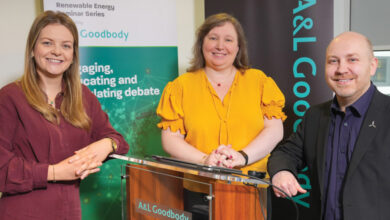Powering ahead in energy law
 A&L Goodbody’s legal team discuss the latest developments in the energy market and how they ensure their team stays ahead of the game in a rapidly developing sector.
A&L Goodbody’s legal team discuss the latest developments in the energy market and how they ensure their team stays ahead of the game in a rapidly developing sector.
How would you describe the energy industry in NI?
David Flinn: We have grown an energy industry in Northern Ireland that has encouraged local entrepreneurship which ultimately means that we are less reliant on outside sources of energy. The industry is now much more efficient, cost-driven and competitive although further competition and improvements are needed.
What trends have emerged in financing of energy projects in recent years?
Ciaran McAlinney: Funding has come from a variety of sources depending on the scale and complexity of transactions including international project finance specialists, domestic banks and niche lenders including international energy funds.
We are increasingly seeing larger developers financing several separate wind farms on a portfolio basis — often using a single finance package with one lead bank or a syndicate of banks. While our experience would suggest that the funding of on-shore wind still dominates the market there is increasing appetite among funders for different technologies and sources of renewable energy.
What will the main challenge be for energy projects following cuts in subsidies in the recent Budget?
Mark Stockdale: The main challenge is going to be working out how to make renewable energy projects sustainable without subsidies, since this is where the industry will ultimately end up. The recent cut in levy exemption certificates could wipe off as much as five per cent of the revenue for an operational wind farm project, and future changes to the Renewable Obligation Certificate scheme could result in a loss of up to 50 per cent of revenue for a new scheme.
The energy market has recently learned that the ROC system is to close – what does this mean for developers in Northern Ireland?
Mark Stockdale: The early closure in Great Britain of the ROC scheme — brought forward from the expected date of April 2017 to April 2016 — is now increasing the pressure on Northern Ireland to follow suit but no decision has yet been made. The result is that the Northern Ireland renewables industry is now in a state of limbo where developers who are trying to finance projects don’t know the cut-off date that they are aiming for.
The Government’s stated replacement for ROCs is the Contract for Difference (CFD). Since CFDs will be auctioned and developers will have to bid for them, this also puts increasing pressure on developers of ‘marginal’ projects to finish out their project in advance of the ROC deadline in case no subsidy is available after this date. It should be noted though that there is currently no guarantee that CFDs will be extended to Northern Ireland and there are concerns that the scheme could even be withdrawn in the UK generally, leaving no subsidies.
What are some of the key considerations taken into account by funders when financing energy projects?
Ciaran McAlinney: A significant consideration is the expertise and experience of the promoter and developer i.e. do they have a good track record in this sector and/or do they have the right people on board including relevant specialist advisers, in order to deliver a project on time and in budget? If a developer is using new technology or a new to market supplier — in waste energy, for example — is the technology proven to work and can the developer illustrate that sufficient due diligence has been done to present to its funders?
Funders will also want to see evidence that the developer has thought out their build and development programme and taken account of key issues in the pipeline, such as the change from ROCs to CFDs in April 2017 or earlier.
What is the impact of the change in the all-island single electricity market on power generators?
Mark Stockdale: Due to be implemented by the end of 2017, this change will significantly impact how generators get paid for their power. Renewable generators may also have to start to forecast their future power output, which is something they haven’t had to do before. In addition, wind farms will require complex weather forecasting.
Operational energy projects will have a very complex set of associated financing documents. Such changes to the regulatory environment will mean that every project operator will have to sit down and not only analyse the impact on their financing structures but also review their documents to ensure they comply with the new market. This could prove to be a very complex exercise.
Outside of renewables and power, what other trends are you seeing in the energy industry?
Mark Stockdale: We are seeing quite a lot of movement in the gas industry, having advised on the acquisition of Phoenix Gas and the current extension of natural gas to the west of Northern Ireland. We are also doing a lot of work on harmonising the NI gas network codes in line with the European Union target model.
Should energy providers be paying attention to Competition law?
Micaela Diver: In the wake of recent market investigations, licensed energy providers should be fully aware of their Competition law obligations alongside the regulatory framework.
Concerns surrounding competition in the energy market have come into focus recently, with the Competition and Markets Authority (CMA) investigation into the energy markets in Great Britain highlighting a range of problems hindering competition in the energy markets, including barriers to entry and expansion and a lack of transparency in respect of tariffs.
Energy providers in Northern Ireland should expect an increased focus on competitiveness in the market, particularly given the CMA’s on-the-ground presence in Northern Ireland as of last year and its continued interaction with the Utility Regulator.
Contracting entities should also be aware of the interlinking of both competition and procurement law and should pay attention to the imminent implementation of both the Concession and Utilities Directives, which will bring about change in how licensed operators can award contracts.
Tell us about the energy team at A&L Goodbody?
Mark Thompson: We act for a broad range of businesses across the sector — developers, financiers, generators, distributors, suppliers and specialist funds — so our energy team is made up of key people from our corporate, commercial, finance, competition and procurement, environmental and planning, property and regulatory teams.
What type of energy projects is the team advising on?
Mark Thompson: We have advised on a broad range of transactions in the sector, from start-up projects (particularly with emerging technology and renewables such as the Evermore Biomass Powerstation in the north west), to mergers and acquisitions in respect of operational assets (such as Eirgrid’s acquisition of SONI; the recent Phoenix Natural Gas transaction and wind farm acquisitions like the 52 MW Windfarm at Slieve Rushen deal).
We are a full service team in this sector, providing a vast range of legal advice for many of the leading organisations on some of the largest and most complex transactions in Northern Ireland’s energy and utilities sector, including: Eirgrid plc; Scottish and Southern Electricity; Gaelectric; Brookfield Renewables; Bord Gais Energy; NI Water and Mutual Energy.
How do you ensure that your team is equipped to respond to such a rapidly developing sector?
Mark Thompson: As a heavily regulated sector, the legislative framework around energy and utilities tends to be very complex, requiring high levels of specialism. As a firm, we invest heavily in our people and support them as they develop specialist expertise and teams. With transaction activity high in the energy sector at the minute, we are committed to continuing our investment in our energy team to ensure that we maintain the most up-to-date and technically advanced legal offering in the local market.
I think we also add to our clients’ interests on the island of Ireland because we bring knowledge and a willingness to build that into our advice, with true energy experts across our offices in Dublin and Belfast allowing us to advise seamlessly on an all-island basis.
Contact:
Mark Thompson, Partner
T: 028 9031 4466
E: mthompson@algoodbody.com






